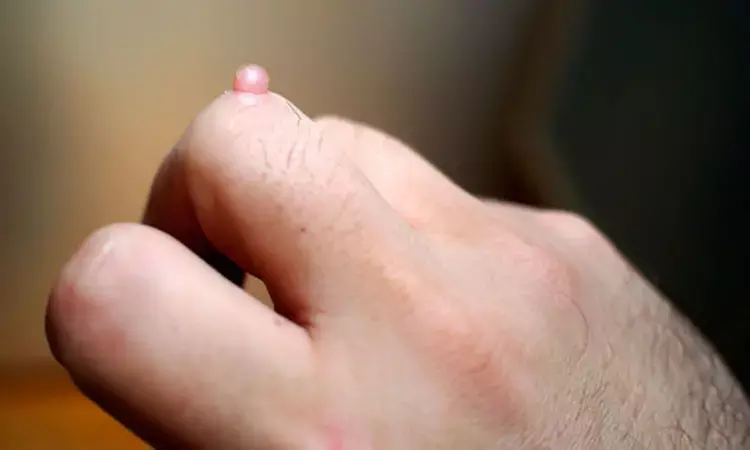- Home
- Medical news & Guidelines
- Anesthesiology
- Cardiology and CTVS
- Critical Care
- Dentistry
- Dermatology
- Diabetes and Endocrinology
- ENT
- Gastroenterology
- Medicine
- Nephrology
- Neurology
- Obstretics-Gynaecology
- Oncology
- Ophthalmology
- Orthopaedics
- Pediatrics-Neonatology
- Psychiatry
- Pulmonology
- Radiology
- Surgery
- Urology
- Laboratory Medicine
- Diet
- Nursing
- Paramedical
- Physiotherapy
- Health news
- Fact Check
- Bone Health Fact Check
- Brain Health Fact Check
- Cancer Related Fact Check
- Child Care Fact Check
- Dental and oral health fact check
- Diabetes and metabolic health fact check
- Diet and Nutrition Fact Check
- Eye and ENT Care Fact Check
- Fitness fact check
- Gut health fact check
- Heart health fact check
- Kidney health fact check
- Medical education fact check
- Men's health fact check
- Respiratory fact check
- Skin and hair care fact check
- Vaccine and Immunization fact check
- Women's health fact check
- AYUSH
- State News
- Andaman and Nicobar Islands
- Andhra Pradesh
- Arunachal Pradesh
- Assam
- Bihar
- Chandigarh
- Chattisgarh
- Dadra and Nagar Haveli
- Daman and Diu
- Delhi
- Goa
- Gujarat
- Haryana
- Himachal Pradesh
- Jammu & Kashmir
- Jharkhand
- Karnataka
- Kerala
- Ladakh
- Lakshadweep
- Madhya Pradesh
- Maharashtra
- Manipur
- Meghalaya
- Mizoram
- Nagaland
- Odisha
- Puducherry
- Punjab
- Rajasthan
- Sikkim
- Tamil Nadu
- Telangana
- Tripura
- Uttar Pradesh
- Uttrakhand
- West Bengal
- Medical Education
- Industry
Intralesional immunotherapy with Candida safe and cheap option for treatment of cutaneous warts: Study

Egypt: A recent study published in the Archives of Dermatological Research has shown intralesional immunotherapy with Candida antigen as a promising treatment option in patients with cutaneous warts.
The study found that intralesional (IL) immunotherapy with Candida antigen was more effective and less painful than Intralesional 2% zinc sulfate for treating cutaneous warts.
For warts treatment, two therapeutic options are used: the destructive method, like cryotherapy, chemical cautery, surgical excision, laser ablation, and electrocauterization, which are painful and with common recurrence. The second is immunotherapy, which depends on the immune system activation to suppress virus activity. Such therapy can be applied through intralesional injection, topical, or systemic administration.
Intralesional immunotherapy with different skin test antigens such as mumps, Candida, or trichophyton antigen induces a delayed type of hypersensitivity response to several antigens and the wart tissue resulting in Th1 cytokines production, which activate natural killer and cytotoxic cells to remove HPV infection. This clears distant warts along with local warts.
Zinc is critical for immune regulation; it is deficient in patients with multiple or recurrent warts. Zinc is used in warts treatment in many previous studies, systemic or topical, while few studies use intralesional. Different Candida antigen concentrations (1/100 and 1/1000) and zinc sulphate 2% were not compared previously with regards to their efficacy in warts treatment.
Against the above background, Eman M. Kamal Youssef from Assiut University in Asyût, Egypt, and colleagues compared the efficacy and safety of intralesional candida antigen to intralesional 2% zinc sulfate for warts treatment in a prospective controlled clinical trial.
The trial included one hundred and five patients presenting with plantar, common, and plane warts. They were randomly categorized into three groups, each group comprising 35 patients. In Group 1, patients were treated with intralesional candida antigen (Ag) 1/100; in Group 2, they were treated with intralesional candida Ag 1/1000; and in Group 3 treated with intralesional zinc sulfate 2%.
The researchers found that target warts of group 1 displayed a higher rate of complete clearance than group 2 and group 3 (94.3%, 77.1, 74.2%), respectively.
"We found intralesional immunotherapy with Candida antigen to be more effective and less painful than intralesional 2% zinc sulfate for treating cutaneous warts and less," the researchers wrote. "Both IL Candida 1/100 and 1/1000 concentrations were effective, tolerable, and showed nearly the same efficacy."
There are significant advantages of intralesional Candida Ag and IL zinc sulfate immunotherapy over other treatments for warts, like clearance of distant warts and single injection sites. It's a cheap, simple, safe and effective procedure with no scarring risk at the intervention sites. It can be used as an alternative modality to treat plane, common, and plantar warts, either new or resistant.
Reference:
Youssef, E.M.K., Eissa, MAA & Bakr, RM Intralesional Candida albicans antigen versus intralesional zinc sulfate in treatment of cutaneous warts. Arch Dermatol Res (2022). https://doi.org/10.1007/s00403-022-02499-w
Dr Kamal Kant Kohli-MBBS, DTCD- a chest specialist with more than 30 years of practice and a flair for writing clinical articles, Dr Kamal Kant Kohli joined Medical Dialogues as a Chief Editor of Medical News. Besides writing articles, as an editor, he proofreads and verifies all the medical content published on Medical Dialogues including those coming from journals, studies,medical conferences,guidelines etc. Email: drkohli@medicaldialogues.in. Contact no. 011-43720751


